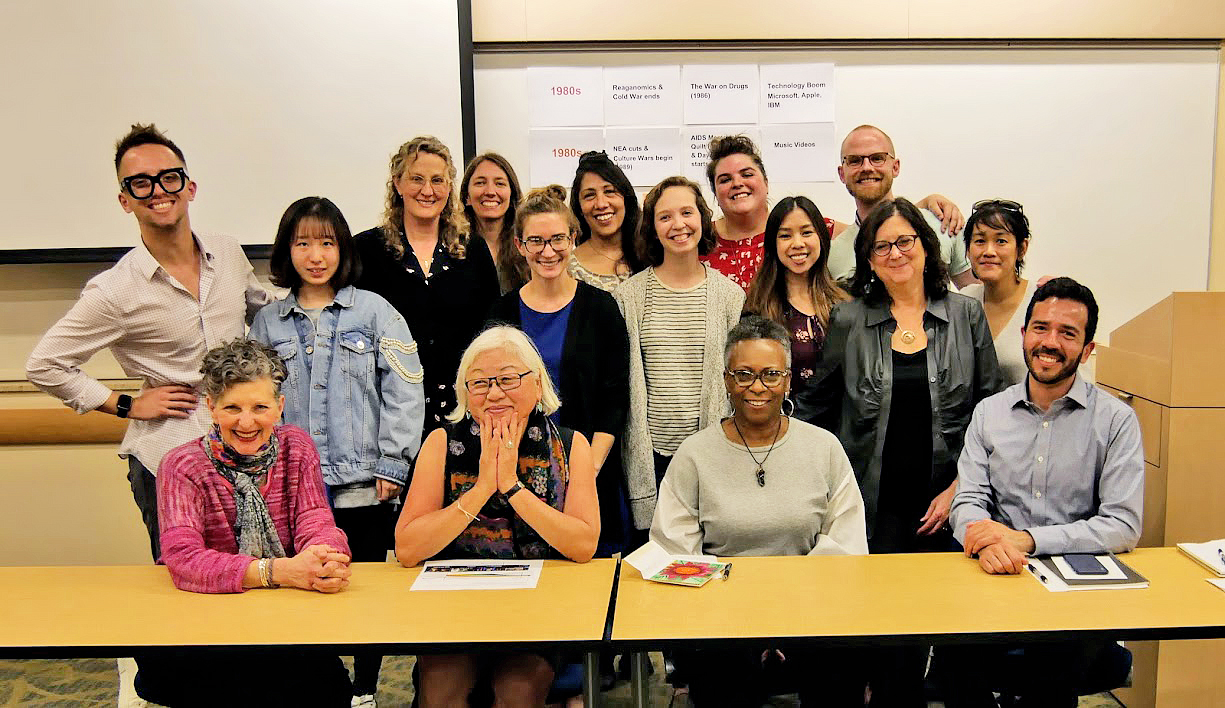In 2018, Seattle University’s MFA in Arts Leadership and Lemieux Library, in partnership with the local cultural community, launched the Arts Ecosystem Research Project (AERP), dedicated to researching, documenting, and sharing information about the region’s dynamic arts and culture sector since 1962.
Focusing on the organizations, businesses, and major events that have shaped the unique character and innovative approach of the Seattle and King County arts ecosystem, the first phase looks at the fifty years from the 1962 Seattle World’s Fair to 2012. Lemieux Library will be the public point of access to the research, hosting a website with a digital timeline and repository, which is currently under development.
“Applied research in the field – research that extends traditional scholarship into the realm of practical application – is a critical component of the SU MFA Arts Leadership program,” says project founder and adjunct faculty member Claudia Bach. “Students taking our new elective, Applied Research Seminar: Arts Innovation is Seattle, master concepts, develop their research skills, and expand their knowledge as future arts leaders by conducting and adding research to AERP each year.”

A unique feature of the project is a deep community connection developed from the very beginning. Three highly respected members of the cultural community provide guidance, context, and varied perspectives for the project: arts marketer and advocate Vivian Phillips, KUOW arts reporter Marcie Sillman, and arts project manager and writer/editor Mayumi Tsutakawa. Seattle University Research Services Librarian Felipe Anaya and Bach, along with Arts Leadership program director Kevin Maifeld and faculty members Roxanne Hornbeck and Jasmine Mahmoud round out the AERP advisory group.
“The combination of students’ academic research and community benefit is particularly powerful,” says Bach. “The students are learning from the experiences of those who came before them, so it is very intergenerational. At the same time, they are creating a resource that will inform the next wave of arts leaders.”
During the inaugural Applied Research Seminar in Winter quarter 2018, 15 graduate students gathered data via interviews and open-ended surveys from 74 arts leaders representing a cross section of the cultural spectrum.
“We are fortunate that many of the individuals involved are able contribute to the understanding of the legacy and lineage of this still young and vibrant arts ecosystem. From the beginning, it has been our goal to capture significant information directly from the people who lived these experiences before their insights are lost forever,” adds Philips. “We are creating a holistic source for examining and informing future artistic ventures, policies, and funding, while grounding students committed to entering the field with a context of historical data.”
With data on noteworthy moments and seminal arts events, organizations, and businesses in the region, students identified more than 200 potential entries for the AERP timeline, as well as a great deal of additional information on the context and evolution of the sector, resulting in an initial 100 pilot entries created during spring and summer 2018, shaping the development of the website. Respondents also provided more than 300 suggestions of additional potential research contacts, and numerous offers to participate in further research such as case study development.
This year, students focused on developing exploratory case studies to provide depth to timeline entries. The process of creating these case studies will guide the development of future case studies over the coming years.
With support from Dean Sarah Watstein and Research Services Librarian, Felipe Anaya, the Lemieux Library has taken a key role in developing the website and institutional repository. “We are committed to AERP becoming a sustainable academic and community resource,” says Dean Watstein. “We hope to launch the website and institutional repository this summer with the initial timeline and case studies creating the platforms for future research by our students and to provide broad access to the community as the project develops.”
The Seattle Office of Arts & Culture and 4Culture have provided support to help get AERP underway. Other supportive entities include MOHAI and Seattle Public Library.
“Students continue to be enthusiastic about the project, with some interested in extending their participation even after they have completed the class,” Bach says. “It is also garnering national interest from the academic field of arts administration.”
The advisory group is exploring additional ways to structure and support the long-term project to fulfill its potential, including a newly formed “Friends of the Arts Ecosystem Research Project” in association with Shunpike. To learn more about the Arts Ecosystem Research Project, contact Claudia Bach, or Kevin Maifeld, Director of the Arts Leadership Program.
Photo: MFA students and faculty and AERP community advisors.

